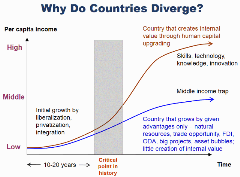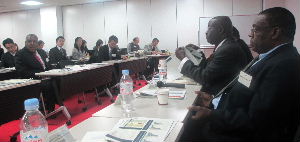Research 2014-15
Policy research in Thailand & Cambodia
(Jun. 2015)
A GRIPS Development Forum team visited Thailand and Cambodia from May 25 to 29.
In Thailand we updated information on FDI-local firm matching for input procurement or joint venture partnership. There are several organizations promoting this linkage including BOI Unit for Industrial Linkage; Bureau of Supporting Industry Development of MOI; Japan Desk & One-Start-One-Stop Center under the Board of Investment (BOI); Japan Desk under MOI; Alliance for Supporting Industries Association (business association group); and Technology Promotion Association (industrial NPO). FDI-Thai firm matching is a difficult task, and no one organization can cover everything, but it is conducted reasonably well in Thailand with formal & informal networking and mutual reference among organizations.
In Cambodia we studied overall quality & practice of industrial policy. From the position of very weak policy capability, Cambodia is gradually gaining policy ownership. The Rice Policy, revisions of FDI law, a new SEZ law, and the development plan of Sihanoukville were drafted and some began to be implemented. The latest addition is the Industrial Development Policy (IDP) 2015-2025, approved in March 2015, that guides Cambodia's future industrialization. The broad direction of IDP is well-focused and reasonable, but implementation details must now be worked out. Policies are crafted and executed by a joint effort of several top technocrats. The Supreme National Economic Council (SNEC), the Ministry of Economy and Finance (MEF), and the Council for the Development of Cambodia (CDC) are the three lead policy mechanisms. Cambodia's current industrial policy is limited, but its dynamic mindset may produce good policies in the future.
Poor policy causes middle income traps
(May 2015)
 |
|
Click graph to enlarge |
I drafted a paper on "The Quality of Industrial Policy as a Determinant of Middle Income Traps" for a Singapore conference in August. This is an attempt to grade and compare industrial policy quality across countries based on our past policy visits & research. 13 governments in Asia and Africa are evaluated. More may be added in the future.
Preliminary results show that (i) there is a wide gap in policy quality across countries from excellent to poor (Asia is not always better than Africa); (ii) policy quality and per capita income are positively correlated (0.748); (iii) quality of various policies are similar within any government; and (iv) there is little evidence that resource endowment affects policy quality in one way or another.
The paper argues that proactive industrial policy needs to be learned and practiced because Washington Consensus policies (liberalize, privatize & integrate) cannot stimulate growth of a country trapped in middle income.
Policy quality comparison Policy quality graph Full paper
Policy research mission to Indonesia
(Jun. 2014)
The GRIPS Development Forum team, together with two Vietnamese experts, visited Jakarta to study its industrial policy method. Indonesia has emerged as a huge middle income country with a population of 250 million and per capita income of $3,500. A very strong domestic demand attracts FDI firms, but export competitiveness remains elusive. Unlike Thailand (cars & pickup trucks), Malaysia (electronics & chips) or Vietnam (smart phones), there is no major manufactured product that Indonesia exports. Economic policy is turning inward & nationalistic in contrast to many neighbors which are open & outward-looking. Jakarta's transport system is seriously inadequate and wage pressure is far beyond labor productivity performance.
While
policy making is reasonably competent, policy execution is weak despite a
half century of industrialization. FDI, SME and TVET policies are more
fragmented than in Thailand, Malaysia, and even Vietnam. One reason is
big-bang decentralization that started in the early 2000s. Central
ministries lost the policy grip as most policy implementation is in the
hands of local governments. To overcome the middle income trap, Mr. Joko
Widodo, the new president (photo from TV debate), must upgrade human capital
and enterprise capacities as a top national agenda, not just building
infrastructure and restricting & controlling FDI.
WTO
and industrial policy
(May 2014)
WTO has created 15 expert groups (E15) to review its functions. One of them is "Reinvigorating Manufacturing" whose first meeting was held in May 30-31 in Beijing, China. I was one of the invited experts.
WTO is often considered as a rule setter cum dispute settlement mechanism which is not very kind to latecomer development. Moreover, in recent years trade & investment issues have been negotiated by bilateral and regional mechanisms, not WTO. Apparently, WTO wants to reassert itself in a world where industrial policy is increasingly important.
I contended as follows: (i) WTO rules are quite ambiguous as to how much industrial policy is permitted and big countries often impose their own interpretations; (ii) WTO should balance rule setting with the need of latecomers to industrialize; (iii) WTO should clarify permitted policy measures and even proactively guide and assist developing countries to use them. Many participants, including WTO legal experts, agreed with my view. It is not yet clear whether WTO will take this proposal seriously - and that will decide whether I will attend the next E15 meeting.
Is
Vietnam already in a middle income trap?
(revised Apr. 2014)
 Vietnam is reviewing
the 30 years of Doi Moi (economic liberalization) and the possibility of a
middle income trap is rapidly becoming a popular topic for discussion
among policy makers.
Vietnam is reviewing
the 30 years of Doi Moi (economic liberalization) and the possibility of a
middle income trap is rapidly becoming a popular topic for discussion
among policy makers.
GRIPS, National Economics University (Hanoi), and Industrial Policy Strategy Institute (Vietnam's Ministry of Industry and Trade) co-hosted a workshop on "Creating New Growth Momentum" in Hanoi on March 26, 2014. I was the first keynote speaker presenting multiple evidence that a middle income trap had already begun in Vietnam only six years after the country achieved a lower middle income status. I proposed several concrete actions to overcome this problem, including productivity focus, proper policy structure & procedure, FDI-linked technology transfer with detailed policy components, and introducing several standard policy measures not yet adopted in Vietnam (kaizen, benchmarking, scaling-up of pilot projects, national productivity movement, etc.)
Additionally, on April 15, the Communist Party Economic Committee organized a symposium on overcoming the middle income trap where I was also invited to speak. On both occasions my argument was covered extensively by TV and news & online media.
Light manufacturing
in Africa
(Mar. 2014)
 My GDF team
invited Dr. Ed Brown and Dr.
Joe Amoako-Tuffour from the African Center
for Economic Transformation (ACET, in Accra) and Dr. Hinh Dinh (WB, in
Washington) to Tokyo for a symposium on Africa's light manufacturing at
GRIPS on March 7, 2014. Additional meetings with Japanese officials and
researchers were also arranged.
My GDF team
invited Dr. Ed Brown and Dr.
Joe Amoako-Tuffour from the African Center
for Economic Transformation (ACET, in Accra) and Dr. Hinh Dinh (WB, in
Washington) to Tokyo for a symposium on Africa's light manufacturing at
GRIPS on March 7, 2014. Additional meetings with Japanese officials and
researchers were also arranged.
ACET just published the African Transformation Report which ranked the transformation performance of individual African countries and showed alternative possible paths for growth with DEPTH (diversification, export competitiveness, productivity, technology, human wellbeing). Dr. Hinh Dinh recently published a series of light manufacturing studies featuring Africa and Asia and a number of individual countries. Their results, together with industrial activities of GRIPS and JICA in Africa, were shared with audience which included officials, researchers, investors and consultants, media, foreign missions, etc.